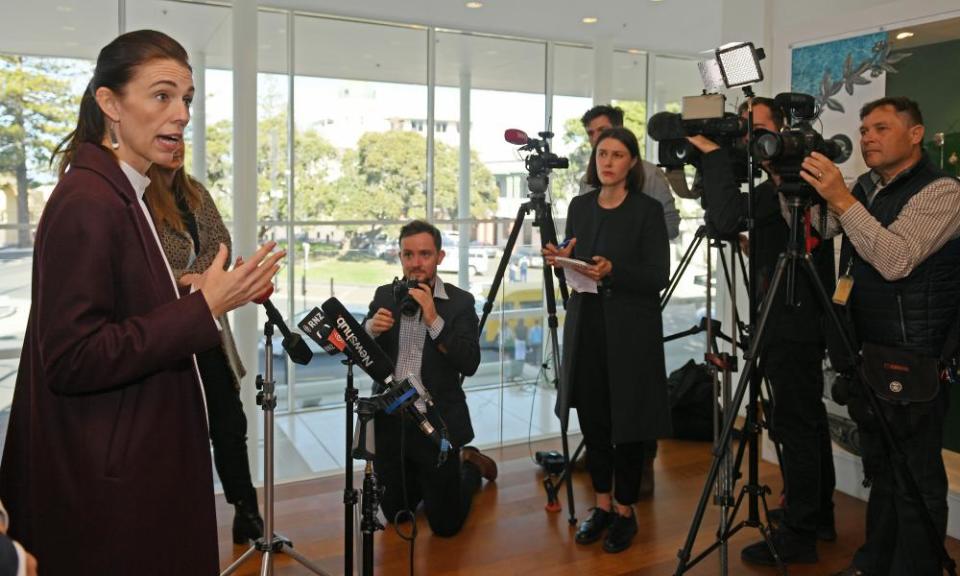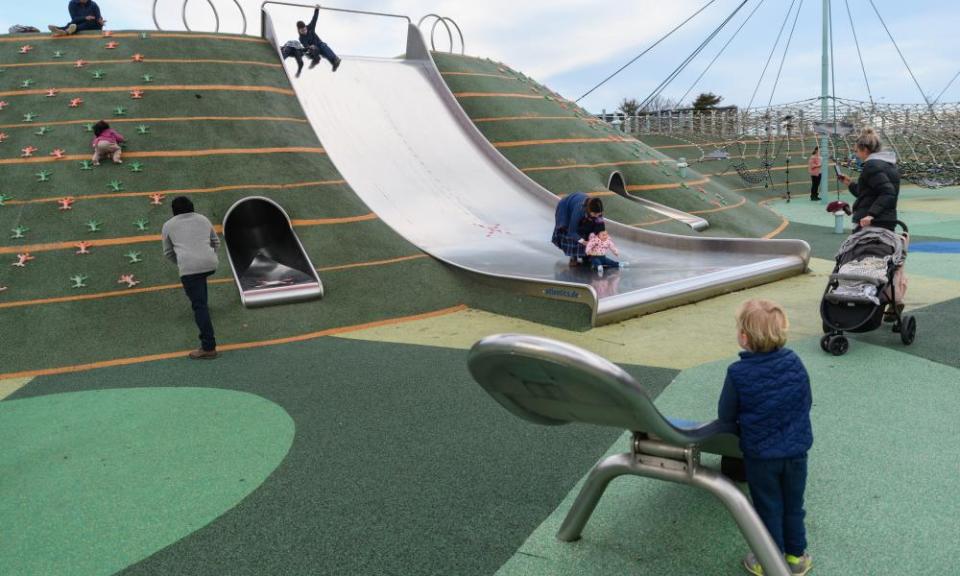'Can't quite believe it': New Zealand tiptoes towards elimination of coronavirus

As health officials announce each new day of no new Covid-19 cases, social media explodes with New Zealanders celebrating the news.
“That feeling like you got away with something that seemed impossible and you can’t quite believe it even though you want to believe it,” wrote one, on Twitter. “But for an entire country.”
Twenty-two New Zealanders have died of Covid-19, ; thousands have lost their jobs and the nation’s largest export sector, tourism, lies in tatters. But as New Zealanders look to the hundreds of thousands of deaths recorded in other countries, there is a sense that the rest of the world faced a different pandemic, the disastrous scale of which never fully arrived here.
Now, providing there are no new and unexpected cases to marr the country’s 14-day streak of zero fresh instances of Covid-19, scientists say they expect to be able to declare next week that the virus has been eliminated from New Zealand – making it the first country among the OECD group of wealthy nations, and the first country that has recorded more than 100 cases to make such a statement, analysts said.

Data provided to the Guardian by the Ministry of Health, showing that the last person to known to have contracted the virus domestically from an unknown source had been diagnosed on 29 April and remained in quarantine until 18 May, was “pretty reassuring”, said Nick Wilson, a public health specialist from the University of Otago.
“According to our model that would put us nearly at the 99% probability of elimination,” he said. The health ministry said elimination of the coronavirus could be declared 28 days after the last confirmed domestic case of the illness had left quarantine, which would be on 15 June (Wilson said the ministry’s definition was especially cautious).
‘Something like normal back’
While many other nations, Britain among them, attempt to balance easing restrictions on their stalled economies with determining acceptable levels of risk for their populations, New Zealand’s government is poised to drop all rules except border controls as soon as next week. Its leaders hope the virus’ spread might have been quelled altogether.
“Life is not entirely back to normal here, but we’ve got something like normal back,” says Shaun Hendy, a scientist at the University of Auckland, who was involved in a study used by New Zealand’s health ministry that predicted tens of thousands of deaths if the virus was not contained. “There’s a very high chance that we’ve eliminated the disease domestically and there’s so few parts of the world that have the options and choices we do.”
Related: Ardern says New Zealand on track to eliminate coronavirus 'ahead of schedule'
The veteran science communicator said he had been “literally shaking” after a breakfast television interview that took place before prime minister Jacinda Ardern strictly locked down the country on 25 March, during which he discussed his team’s “confronting” predictions for how the disease could spread.
“Both doing the modelling and then telling people about it was quite terrifying and very affecting,” says Hendy. At the time, about 200 people in New Zealand were confirmed to be infected with Covid-19. Then New Zealanders were barred from leaving their homes for a month and Hendy’s models never came to pass.
Now, fewer than 1,500 have been confirmed infected, and many New Zealanders still don’t know anyone who is known to have had it. In Wellington, the capital, the last person confirmed to have survived the coronavirus was recorded as recovered more than three weeks ago.
As well as the binary-code daily pattern of zero cases or one new case – a daily news conference by health officials also serves to update New Zealanders on the status of the last known patient confirmed to have it.
The lone sufferer, an anonymous Auckland woman, is not in hospital. On the day she is declared recovered, and if no new cases are recorded before then, New Zealanders will be eager to close the book on a strange chapter in the country’s history. Many seem divided between a desire to return to normal life and nerves about doing so.
Some 487,000 people – or a 10th of the population – have registered for a government contact-tracing app and in Wellington, uptake seems piecemeal. Most businesses in Wellington provide some sort of contact tracing – very few of them using the official government app, with most preferring alternative apps or websites – and scarcely any ask to see that customers have signed in. By and large it’s an honour system, suggesting a widespread presumption that the virus has vanished.
When can we have an elimination party?
But health officials have resiled from trumpeting an “elimination date” when the country is deemed free of the coronavirus. Elimination is “an ongoing process”, New Zealand’s director general of health, Ashley Bloomfield, told reporters on Wednesday. Even the top health official’s naturally cautious demeanour, however, has given way to optimism at his near-daily briefings in recent weeks.
“I know there has been speculation about when we might be able to say, ‘Here is the point we have eliminated Covid-19,’” he said. “It may well be [when] there is no domestic transmission or domestic onshore infection of Covid-19, and it would be great if we reached that point and it increasingly looks like we are.”
New Zealand has drawn the world’s attention as generating an exceptional approach to vanquishing the virus – which Wilson says was part luck and part action.
“It could be that the sheer intensity of New Zealand’s lockdown has given it an extra edge in this accelerated downward trend,” said Wilson, the scientist, adding that the shutdown measures were “some of the most intense in the world”.
New Zealand had not gotten everything right, however; the country’s isolation had provided some buffer for the virus; it takes 24 hours to travel by plane to the island nation from the northern hemisphere. But mask-wearing never caught on in the country, Wilson says – officials have never recommended it – and contact tracing has been seriously lacking until it was beefed up during the strictest weeks of lockdown.
Clear and unifying communication from prime minister Jacinda Ardern – who rallied the small nation with near-daily speeches that appealed for compassion and teamwork – was “a big part of the success story”, Wilson says.

As the weeks have worn on, the lockdown measures have become increasingly politicised, with Ardern’s detractors urging her to abandon the remaining physical distancing and gathering rules immediately, rather than waiting until next week to decide as she plans to.
But New Zealanders have overwhelmingly supported the lockdown measures; 88% of those polled in April said they approved of the government’s approach, and Ardern has soared to record approval ratings during the crisis.
The scale of job losses has yet to be realised – Treasury predictions begin at 8.5% and stretch as high as around 25% – but some analysts said people’s confidence in their government and health system was more important to stimulate spending than lifting lockdown measures.
Shamubeel Eaqub, an economist with Sense Partners in Auckland says that when some US states reopened for business, people’s wallets did not; he adds that New Zealand’s stricter lockdown has not so far resulted in more job losses than in comparable countries.
Related: Vast majority of New Zealanders don't want to return to office after Covid-19
As the days of zero new cases tick by, even New Zealand’s infectious disease specialists, some of whom sounded the alarm on what they said was woeful contact tracing and health system underpreparedness early in the pandemic, are urging celebration.
“Can we please start planning the Covid-19 elimination party?” said one, Ayesha Verrall – a physician at the University of Otago – on Twitter, adding that a consensus was still needed on what such a date would be. “But we can start thinking about the music, venue, snacks and who is coming.”
Elimination would require strong border controls, high rates of testing, and a public health system “at the ready,” she added.
“But if we make it to 28 days it would be such a massive achievement and we would deserve a party.”

 Yahoo News
Yahoo News 
